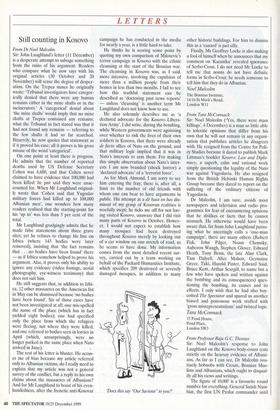LETTERS
Still counting in Kosovo
From Dr Noel Malcolm Sir: John Laughland's letter (11 December) is a desperate attempt to salvage something from the ruins of his argument. Readers who compare what he now says with his original articles (30 October and 20 November) will sense the degree of desper- ation. On the Trepca mines he originally wrote: 'Tribunal investigators have categor- ically denied that there were any human remains either in the mine shafts or in the incinerators.' A 'categorical' denial about 'the mine shafts' would imply that no mine shafts at Trepca contained any remains; what the Tribunal in fact stated was that it had not found any remains — referring to the few shafts it had so far searched. Bizarrely, he now quotes that statement as if it proved his case; all it proves is his gross misuse of the word 'categorical'.
On one point at least there is progress. He admits that the number of reported deaths used by US Defense Secretary Cohen was 4,600, and that Cohen never claimed to have evidence that 100,000 had been killed: he just said they were unac- counted for. When Mr Laughland original- ly wrote that 'Cohen said that Yugoslav military forces had killed up to 100,000 Albanian men', one wonders how many readers realised that the starting-point for his `up to' was less than 5 per cent of the total.
Mr Laughland grudgingly admits that he made false statements about three grave sites; yet he refuses to change his line on lzbica (where 143 bodies were later removed), insisting that 'the fact remains that .. . no bodies have been found' there — as if lzbica somehow helped to prove his argument. Alas, it proves only his ability to ignore any evidence (video footage, aerial photography, eye-witness testimony) that does not suit him.
He still suggests that, in addition to lzbi- ca, 12 other massacres on the American list in May can be dismissed because `no bodies have been found'. Six of those cases have not been investigated at all; one mis-spelled the name of the place (which has in fact yielded eight bodies); one had specified only the place from which the refugees were fleeing, not where they were killed; and one referred to bodies seen in lorries in April (which, unsurprisingly, were no longer parked in the same place when Nato arrived in June).
The rest of his letter is bluster. He accus- es me of bias because my article referred only to Albanian victims; do I really need to explain that my article was not a general survey of the conflict, but a reply to his own claims about the massacres of Albanians? And for Mr Laughland to boast of his even- handedness, after the frenetic anti-Kosovar campaign he has conducted in the media for nearly a year, is a little hard to take.
He thinks he is scoring some point by quoting my own comparison of Milosevic's terror campaign in Kosovo with the ethnic cleansing at the start of the Bosnian war. The cleansing in Kosovo was, as I said, more intensive, involving the expulsion of more than a million people from their homes in less than two months. I fail to see how this truthful statement can be described as 'doctoring past news reports' — unless 'cleansing' is another term Mr Laughland does not know how to use.
He also solemnly describes me as 'a declared advocate for the Kosovo Libera- tion Army'. I did write, during the bombing, while Western governments were agonising over whether to risk the lives of their own soldiers in Kosovo, that there were already de facto allies of Nato on the ground, and that military logic implied that it was in Nato's interests to arm them. For making this simple observation about Nato's inter- ests I ant now branded (shock horror) a 'declared advocate' of a 'terrorist force'.
As for Mark Almond, I am sorry to see him entering the fray; there is, after all, a limit to the number of old friends with whom one can bear to have arguments in public. His attempt at a de haul en bas dis- missal of my grasp of Kosovan realities is woefully inept; he ticks me off for not hav- ing visited Kosovo, unaware that I did visit many parts of Kosovo in October. Howev- er, I would not expect to establish how many mosques had been destroyed throughout Kosovo merely by looking out of a car window on one stretch of road, as he seems to have done. My information comes from the most detailed recent sur- vey, carried out by a team working on behalf of the Packard Humanities Institute, which specifies 209 destroyed or severely damaged mosques, in addition to many
'Does this say "Our Saviour" to you?' other historic buildings. For him to dismiss this as a 'canard' is just silly.
Finally, Mr Geoffrey Locke is also making a fool of himself when he announces that my comment on `Kacaniku' revealed ignorance of Serbo-Croat. I do not need Mr Locke to tell me that nouns do not have definite forms in Serbo-Croat; he needs someone to tell him that they do in Albanian.
Noel Malcolm
The Bosnian Institute, 14/16 St Mark's Road, London W11






















































































































 Previous page
Previous page